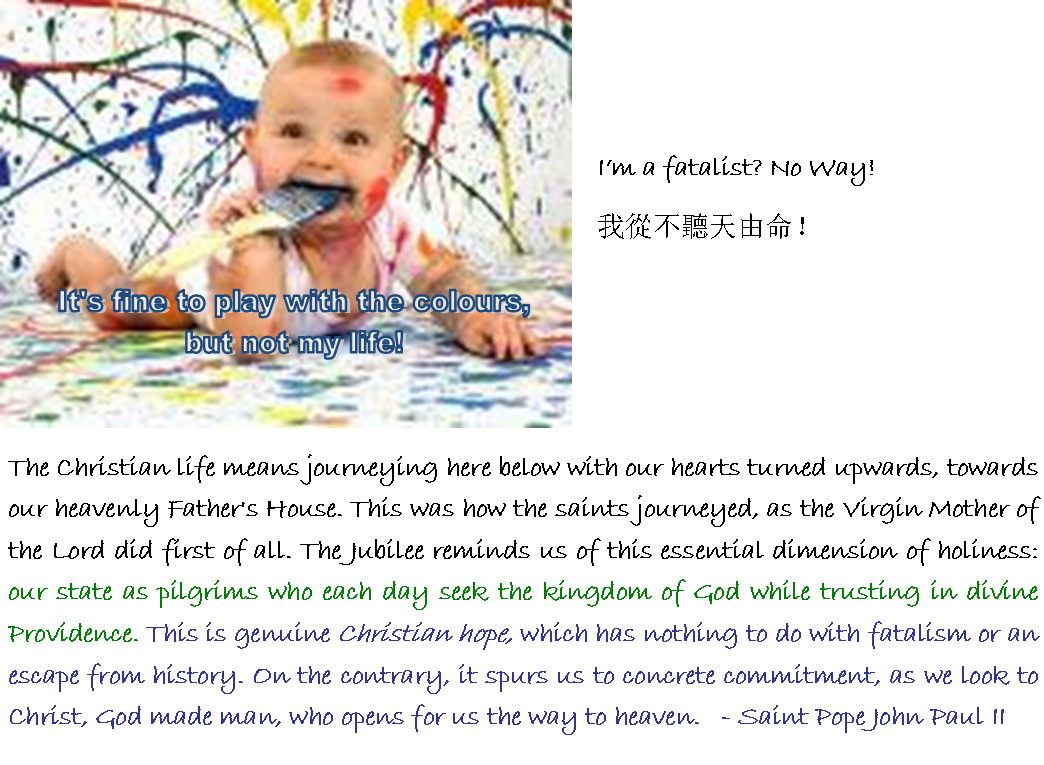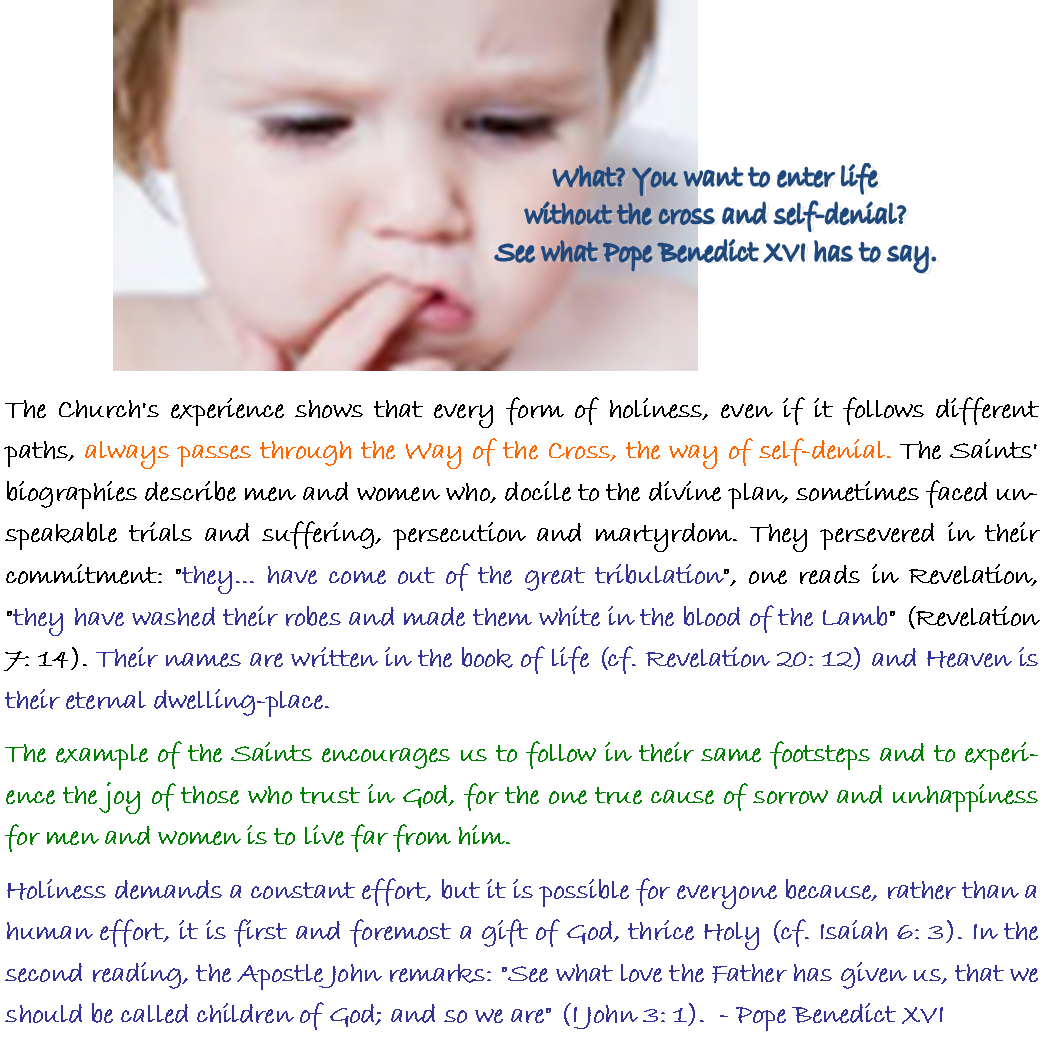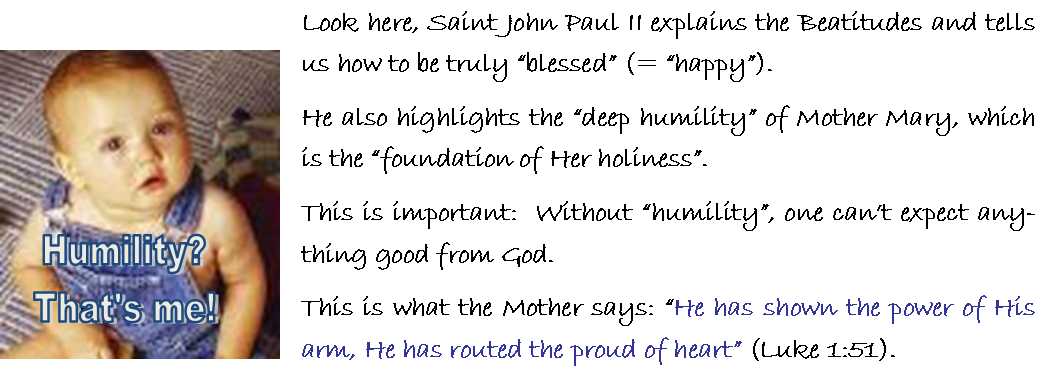|
279 |
|
3. Today's liturgy speaks completely of holiness. But to know what is the way to holiness, we must go with the Apostles up the mount of the Beatitudes to draw near to Jesus and listen to the words of life that come from his lips. Today too he says to us again:
"Blessed are the poor in spirit, for theirs is the kingdom of heaven! The divine Teacher proclaims "blessed" and, we could say, "canonizes" first of all the poor in spirit, that is, those whose heart is free of prejudices and conditionings, and who are therefore totally disposed to the divine will. Their total and trusting fidelity to God presupposes renunciation and consistent self-detachment.
Blessed are those who mourn! This is the blessedness not only of those who suffer from the many misfortunes that belong to the mortal human condition, but also those who courageously accept the sufferings that result from the sincere profession of Gospel morality.
Blessed are the pure in heart! He proclaims blessed those who are not content with outward or ritual purity, but seek that absolute inner rectitude which excludes all deceit and duplicity.
Blessed are those who hunger and thirst for righteousness! Human righteousness is already a very lofty goal, which ennobles the heart of whoever pursues it, but Jesus is thinking of that greater righteousness which lies in seeking God's saving will: blessed above all are those who hunger and thirst for this righteousness. For Jesus says: "He who does the will of my Father who is in heaven shall enter the kingdom of heaven" (Matthew 7: 21).
Blessed are the merciful! Happy are those who overcome their hardness of heart and indifference, to recognize in practice the primacy of compassionate love, following the example of the Good Samaritan and, in the last analysis, of the Father "rich in mercy" (Ephesians 2: 4).
Blessed are the peacemakers! Peace, the sum of all messianic blessings, is a demanding task. In a world marked by tremendous antagonisms and barriers, fraternal harmony inspired by love and sharing must be promoted by overcoming hostilities and conflicts. Blessed are those who dedicate themselves to this most noble endeavour!
4. The saints took these words of Jesus seriously. They believed that they would find "happiness" by putting them into practice in their lives. And they realized their truth in everyday experience: despite their trials, moments of darkness and failures, they already tasted here below the deep joy of communion with Christ. In him they discovered the initial seed, already present in time, of the future glory of God's kingdom.
This was discovered in particular by Mary Most Holy, who lived in unique communion with the incarnate Word, entrusting herself unreservedly to his saving plan. For this reason she was granted to hear, in anticipation of the "Sermon on the Mount", the Beatitude that sums up all the rest: "Blessed is she who believed that there would be a fulfilment of what was spoken to her from the Lord" (Luke 1: 45).
5. The depth of the Blessed Virgin's faith in God's word appears clearly in the song of the Magnificat: "My soul magnifies the Lord, / and my spirit rejoices in God my Saviour, / for he has regarded the low estate of his handmaiden" (Luke 1: 46-48).
In this song Mary shows what constituted the foundation of her holiness: deep humility. We might ask ourselves in what did her humility consist. Much is said to us by the "trouble" she felt at the Angel's greeting: "Hail, full of grace, the Lord is with you" (Luke 1: 28). Before the mystery of grace, the experience of a particular presence of God who has rested his gaze upon her, Mary feels a natural impulse of humility (literally, of "abasement"). It is the reaction of someone who is fully aware of her own littleness before the greatness of God. In the truth Mary beholds herself, others and the world.
Was not the sign of humility the question: "How can this be, since I have no husband?" (Luke 1: 34). She had just heard that she was to conceive and bear a child, who would reign on the throne of David as the Son of the Most High. Certainly, she did not fully understand the mystery of that divine plan, but she realized that it meant a total change in the reality of her life. However, she did not ask: will this really happen? must this happen? She simply said: how can this be? With no doubts or reservations, she accepted the divine intervention that changed her life. The question expressed the humility of faith, the willingness to put one's life at the service of the divine mystery, without being able to understand how it would come about.
This humility of spirit, this complete submission in faith, is particularly expressed in her "fiat": "Behold, I am the handmaid of the Lord; let it be to me according to your word" (Luke 1: 38). Because of Mary's humility, what she would later sing in the Magnificat could be fulfilled: "Henceforth all generations will call me blessed; / for he who is mighty has done great things for me, / and holy is his name" (Luke 1: 48-49).
The greatness of the gift corresponds to the depth of the humility. He who is mighty did "great things" for her (cf. Luke 1: 49), and she knew how to accept them with gratitude and to hand them on to all generations of believers. This is the way to heaven followed by Mary, Mother of the Saviour, who goes ahead of all the Church's saints and blesseds on this path.
6. Blessed are you, Mary, assumed body and soul into heaven! Pius XII defined this truth "for the glory of almighty God ..., for the honour of his Son, the immortal King of the ages and the Victor over sin and death, for the greater glory of his Mother and for the joy and exultation of the entire Church" (Ap. Const. Munificentissimus Deus, AAS 42 [1950], 770).
And we exult, O Mary Assumed into Heaven, as we contemplate you who have been glorified and, in the risen Christ, have become the co-worker of the Holy Spirit in communicating divine life to mankind. In you we see the goal of holiness to which God calls all the Church's members. In your life we recognize the clear sign of the path to spiritual maturity and Christian holiness.
With you and with all the saints we glorify God the Trinity, who sustains our earthly pilgrimage and lives and reigns for ever and ever. Amen. |
|
JOHN PAUL II SOLEMNITY OF ALL SAINTS ANGELUS Wednesday 1 November 2000
1. At the end of this solemn celebration in honour of All Saints, our gaze turns upwards. Today's feast reminds us that we were made for heaven, where Our Lady has already gone and now awaits us.
The Christian life means journeying here below with our hearts turned upwards, towards our heavenly Father's House. This was how the saints journeyed, as the Virgin Mother of the Lord did first of all. The Jubilee reminds us of this essential dimension of holiness: our state as pilgrims who each day seek the kingdom of God while trusting in divine Providence. This is genuine Christian hope, which has nothing to do with fatalism or an escape from history. On the contrary, it spurs us to concrete commitment, as we look to Christ, God made man, who opens for us the way to heaven.
2. In this perspective we are preparing to celebrate All Souls Day tomorrow. We go in spirit to the graves of our loved ones, who have gone before us marked with the sign of faith and now await the support of our prayer. I promise to remember those who lost their lives this year; I am thinking especially of the victims of human violence: in God's heart may they all find the peace for which they long.
3. In this light, Mary appears even more as the Queen of saints and the Mother of our hope. It is to her that we turn, so that she will guide us on the way of holiness and assist us at every moment of our life, now and at the hour of our death.
The Holy Father also greeted the many French-speaking pilgrims participating in the Eucharistic liturgy.
On this All Saints Day I cordially greet the many French-speaking pilgrims who have come to observe the Jubilee and to renew their faith in Christ the Saviour. I am delighted to see the banners assembled here, which have been made with great care and devotion, and I thank all the people who have thus wanted to display the saints of every century. Images of this sort allow us to discover the Church's treasure, the men and women who followed Christ in the priesthood, consecrated life or marriage. Dear friends, may you listen with renewed attention to the call to take the path of holiness, to serve the Lord and your brethren, and to participate in the life of the Church and the world! The Church is counting on you. I bless you wholeheartedly.
Acknowledgment: We thank the Vatican Publisher for allowing us to publish the Homilies of Saint Pope John Paul II, so that they could be accessed by more people all over the world; as a source of God’s encouragements to all of us. |


|
HOLY MASS ON THE SOLEMNITY OF ALL SAINTS HOMILY OF HIS HOLINESS BENEDICT XVI Vatican Basilica
Dear Brothers and Sisters,
Our Eucharistic celebration began with the exhortation: "Let us all rejoice in the Lord". The liturgy invites us to share in the heavenly jubilation of the Saints, to taste their joy. The Saints are not a small caste of chosen souls but an innumerable crowd to which the liturgy urges us to raise our eyes. This multitude not only includes the officially recognized Saints, but the baptized of every epoch and nation who sought to carry out the divine will faithfully and lovingly. We are unacquainted with the faces and even the names of many of them, but with the eyes of faith we see them shine in God's firmament like glorious stars.
Today, the Church is celebrating her dignity as "Mother of the Saints, an image of the Eternal City" (A. Manzoni), and displays her beauty as the immaculate Bride of Christ, source and model of all holiness. She certainly does not lack contentious or even rebellious children, but it is in the Saints that she recognizes her characteristic features and precisely in them savours her deepest joy.
In the first reading, the author of the Book of Revelation describes them as "a great multitude which no man could number, from every nation, from all tribes and peoples and tongues" (Revelation 7: 9).
This people includes the Saints of the Old Testament, starting with the righteous Abel and the faithful Patriarch, Abraham, those of the New Testament, the numerous early Christian Martyrs and the Blesseds and Saints of later centuries, to the witnesses of Christ in this epoch of ours. They are all brought together by the common desire to incarnate the Gospel in their lives under the impulse of the Holy Spirit, the life-giving spirit of the People of God.
But "why should our praise and glorification, or even the celebration of this Solemnity, mean anything to the Saints?". A famous homily of St Bernard for All Saints' Day begins with this question. It could equally well be asked today. And the response the Saint offers us is also timely: "The Saints", he says, "have no need of honour from us; neither does our devotion add the slightest thing to what is theirs.... But I tell you, when I think of them, I feel myself inflamed by a tremendous yearning" (Disc. 2, Opera Omnia Cisterc. 5, 364ff.).
This, then, is the meaning of today's Solemnity: looking at the shining example of the Saints to reawaken within us the great longing to be like them; happy to live near God, in his light, in the great family of God's friends. Being a Saint means living close to God, to live in his family. And this is the vocation of us all, vigorously reaffirmed by the Second Vatican Council and solemnly proposed today for our attention.
But how can we become holy, friends of God? We can first give a negative answer to this question: to be a Saint requires neither extraordinary actions or works nor the possession of exceptional charisms. Then comes the positive reply: it is necessary first of all to listen to Jesus and then to follow him without losing heart when faced by difficulties. "If anyone serves me", he warns us, "he must follow me; and where I am, there shall my servant be also; if any one serves me, the Father will honour him" (John 12: 26).
Like the grain of wheat buried in the earth, those who trust him and love him sincerely accept dying to themselves. Indeed, he knows that whoever seeks to keep his life for himself loses it, and whoever gives himself, loses himself, and in this very way finds life (cf. John 12: 24-25).
The Church's experience shows that every form of holiness, even if it follows different paths, always passes through the Way of the Cross, the way of self-denial. The Saints' biographies describe men and women who, docile to the divine plan, sometimes faced unspeakable trials and suffering, persecution and martyrdom. They persevered in their commitment: "they... have come out of the great tribulation", one reads in Revelation, "they have washed their robes and made them white in the blood of the Lamb" (Revelation 7: 14). Their names are written in the book of life (cf. Revelation 20: 12) and Heaven is their eternal dwelling-place.
The example of the Saints encourages us to follow in their same footsteps and to experience the joy of those who trust in God, for the one true cause of sorrow and unhappiness for men and women is to live far from him.
Holiness demands a constant effort, but it is possible for everyone because, rather than a human effort, it is first and foremost a gift of God, thrice Holy (cf. Isaiah 6: 3). In the second reading, the Apostle John remarks: "See what love the Father has given us, that we should be called children of God; and so we are" (I John 3: 1).
Continue next page …
23 November 2014 |
